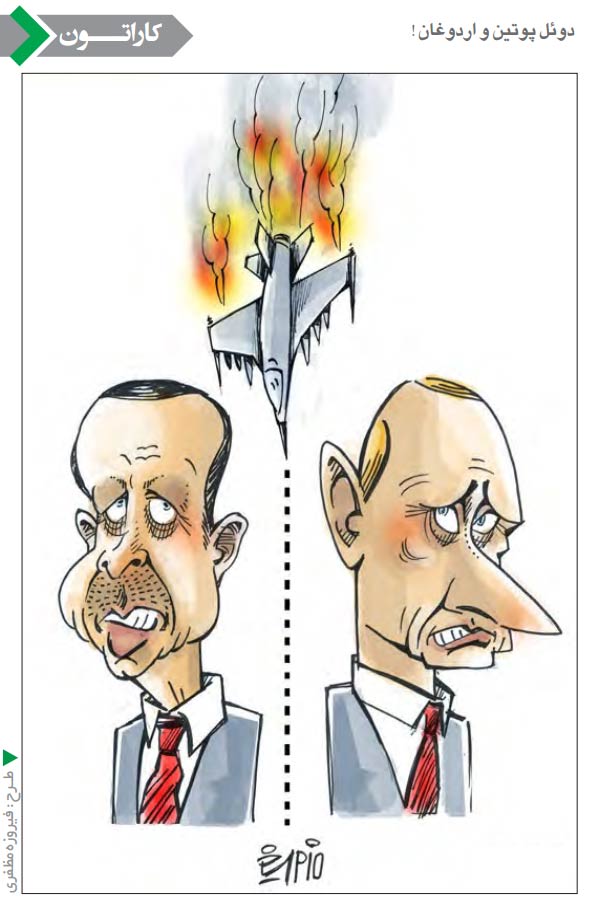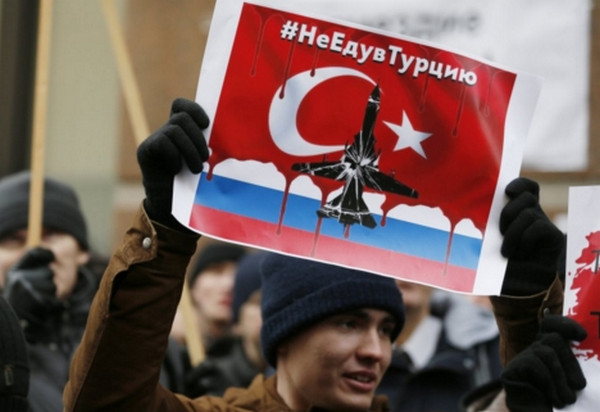From Russia With No Love: How Lives of Turks and Russians Changed After Moscow-Ankara Beef
1,306 views / 17 Feb 2016
At the end of 2015, Russians saw one more country becoming a “non-grata” nation. This happened after a Turkish F-16 fighter jet shot down a Russian Su-24 bomber, which was on a mission in Syria and according to the Turkish government crossed its airspace.
By Daria Zakharova
While the rest of the world was speculating whether the Su-24 was downed in the Syrian or Turkish airspace, Moscow took harsh measures immediately. On the same day the Russian Defense Ministry cut all the military ties with Turkey, three days later the Russian Ministry of Foreign Affairs announced the end of a visa-free regime between the two countries and suggested that Russian citizens refrain from trips to Turkey due to “the high risk of possible acts of terror” in the country.
On November 28, Russian President Vladimir Putin issued an order according to which sanctions were imposed not only on certain goods exported from Turkey to Russia and services of Turkish companies doing business in Russia, but it also affected Turkish citizens living and working in Russia as well. The order prohibiting Russian companies from hiring Turkish citizens (except the members of diplomatic missions) came into force on January 1, 2016. Following the ban, journalist Daria Zakharova spoke with Ozgur Askeri, a Turkish citizen based in Russia who told how Moscow’s ban affected his life. To contrast his experience living in Russia, Zakharova also interviewed Nadezhda Mamaeva, a Russian citizen living in Turkey, to show how Turkey treats Russians after the conflict.
Ozgur Askeri is currently still living in Moscow, but soon will be forced to move back
Daria Zakharova: Did the recent deterioration of Russo-Turkish relations somehow affect your everyday life in Moscow?
Ozgur Askeri: Of course, the entire life of my family has changed. We have to move from Russia because the Russian government banned Turkish citizens from working in Russia and created big obstacles for almost all business lines except some big businesses such as construction.
Daria Zakharova: Can you comment on Turkish citizens getting fired from Russian companies? Did your friends and colleagues suffer from these measures?
Ozgur Askeri: Yes, I have a lot of acquaintances and friends who lost or going to lose their jobs soon and/or get deported.
Daria Zakharova: Many Russians are changing their attitude toward not only Turkey, but Turks as well (especially under the influence of propaganda). Did you personally notice some xenophobia or say ”Turkophobia” in Russia?
Ozgur Askeri: Fanaticism is a very pragmatic instrument for governments which they use for ages in order to keep their power and position through sport, nationalism, religion, etc. With fanaticism a person (or huge masses of people) loses his/her mind, logic, scientific explanation etc. and starts to behave only with primitive “emotions” and instincts so the result is aggression, insults and attacks. Actually it isn’t related to what is written on your passport (Turk or Russian or others). This is just on the surface.
For example in our situation with my wife Yulya it became so ironic: My father is a Turkish citizen with Syrian roots, so I am a half Syrian Turkish citizen and our child Fidel holds both Russian and Turkish passports. The Russian government tells that they help innocent Syrian people, trying to stop terrorism etc. but the actions that they have taken against my family caused the suffering of their own citizens and other innocent people who had nothing to do with the Su-24 plane. So while the Russian government is trying to help some, it ruins the lives of others.
Personally I don’t feel as if I belong to a certain nation so fascists can’t insult me. I am not a paper or a definition that they can blame through other people’s behavior or decisions which I didn’t approve, chose or was involved. I am neither a part of the Turkish Army nor the Turkish government, so the argument of “Why did you shoot our plane?” is not a question that I should answer.
Daria Zakharova: What do you think about modern Russia, its plans and ambitions?
Ozgur Askeri: What is Russia? If it means my wife and her family or her brothers, sister or my very dear friends or it’s very green cities, then I love Russia and them. But if you mean Russia is the country which runs after LGBT members with the order of church or the guys who attack, beat non-Russian people or the NKVD-minded, mafia-like government members, then of course I don’t like at all, as I equally don’t like such people in Turkey or in any other country in the world.
I don’t know anything about the plan of Russia so I can’t comment anything. Because in the last 10 years I heard a lot of plans by the government but they made maybe only 10% of it. What they say is one thing and what they do is another. But still they can appear on TV every day and insist about their plan “Sorry, not this time but the next time for sure!” But how soon is “now” then?
My mother-in-law and father-in-law raised four children and all of them have university degrees and they worked more than 30 years in this country and now the government thinks that less than $100 in retirement pension is a fair deal to them, but millions of rubles is a fair salary for someone who works for companies such as Gazprom or Lukoil. Or the monthly salaries of 400,000 rubles (about $6,000) for deputies and high-ranking government officials.
Nadezhda Mamaeva currently lives and works in Istanbul, Turkey
Daria Zakharova: Did the recent deterioration of Russo-Turkish relations affect your daily life in Istanbul?
Nadezhda Mamaeva: At the moment this conflict hasn’t influenced my life, though there’s a possibility of a resonance which can, first of all, jeopardize my employment in a Russo-Turkish company. Nevertheless, I don’t feel any changes in my daily life.
Daria Zakharova: As of January 2016 the Russian government banned Russian companies from hiring Turkish citizens. Many have already been fired. Did you see a similar thing for Russian citizens working in Turkey?
Nadezhda Mamaeva: I haven’t witnessed it and never heard about anything of that kind.
Daria Zakharova: Do you feel that russophobia is developing in Turkey after the conflict? Do Russo-Turkish relations matter a lot for Turks?
Nadezhda Mamaeva: Relations with Russia are very important for Turks. In general there’s a certain feeling of regret over what happened between our countries. Many also suggest that there’s a prospect of a ”thaw” in Russo-Turkish relations, but it will take a while.
Daria Zakharova Do you think Turkey will impose any retaliatory sanctions against Russia? How would it influence both countries?
Nadezhda Mamaeva: I don’t think that Turkey will impose any sanctions against Russia. Everything I heard from local media seemed to be just an attempt of the government to demonstrate its power to Turkish people.
Daria Zakharova: What do you think about modern Russia, its plans and ambitions?
Nadezhda Mamaeva: Recent measures taken by the Kremlin caused my deep disappointment. I don’t think Putin’s desire to maintain his dictatorship and all the steps, which further separated Russia from the rest of the world, are correct. The measures taken against Turkey are just Putin’s attempt to demonstrate his authority, so called “exhibition performance.” I think Putin and Erdogan are doing “cock-fighting” which have destroyed a relationship between two previously friendly nations. Nations which until today were linked economically and strategically.
Disclaimer: the views and opinions contained in this article are those of the author. They do not necessarily represent the views of Russian Accent.
POST A COMMENT
Your email address will not be published. Required fields are marked *



comments (0)
Write a comment share your opinions with others.